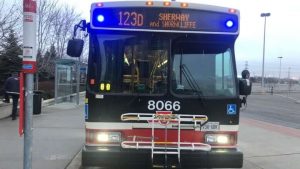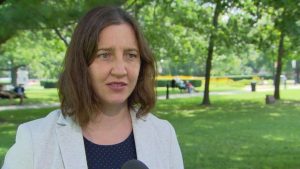Province tells Toronto to consider replacing low-performing bus routes with ‘microtransit’

According to the TTC, the 132 Milner bus route — which runs parallel to Highway 401 in Scarborough — served about 3,600 customers per weekday before the pandemic.
That’s a far cry from Toronto’s busiest routes, like 29 Dufferin, which served upwards of 27,200, or 52 Lawrence West, which served nearly 44,000.
But Austin Jafri, who grew up in Scarborough and still lives there, says routes like the 132 are important, snaking through smaller streets to pick up racialized and low-income riders.
“The reason ridership is low is because the service is not great; it comes every half-hour,” he said.
Now a member of the transit advocacy group TTC Riders, Jafri is rattled by the provincial demand that Toronto look at whether microtransit could better serve the city’s lowest performing bus routes — some of which draw just a few hundred customers a day — saying that the real answer is to improve bus service long-term.
As first reported by the Toronto Star, a letter sent to Mayor John Tory from Transportation Minister Caroline Mulroney lays out a series of conditions the city has to meet to be eligible for a second round of emergency TTC funding to compensate for losses due to the COVID-19 lockdown.
The letter, dated Aug.12, says Toronto must review low-performing bus routes and work with the province and Metrolinx to determine “the feasibility of implementing microtransit options.”
The term “microtransit” usually refers to transit systems where the customer summons a ride on-demand via a website or app, sometimes through a public-private partnership with companies like Uber.
Innisfil partners with Uber
That’s the approach taken by communities like the Town of Innisfil in Simcoe County about 100 km north of Toronto — which opted to subsidize Uber rides for residents back in 2017 rather than pay for bus routes.

Three years later, the town says it remains a success, with 76 per cent of residents reporting being “happy” or “very happy” with the system.
Other Ontario municipalities have other variations of microtransit. Belleville, for example, still uses buses but allows users to book on-demand trips in the evenings.
As for the Ministry of Transportation, it hasn’t clarified whether a private partnership with a company like Uber is part of its vision for microtransit.
“Microtransit refers to small scale, flexible transportation services,” said a Ministry of Transportation spokesperson.
“[It] may offer a more sustainable way to provide transit service to unserved and underserved areas.”
Opening the door to congestion?
NDP transit critic Jessica Bell takes issue first and foremost with any conditions being attached to the province’s funding of the TTC during the pandemic.
“Premier Ford should not be tying any strings attached to this funding,” she said.
She also says asking municipalities to “replace public bus service with privatized car service” opens the door to congestion, increased cost for municipalities, and fare hikes.
Jafri also worries that any switch to a microtransit model could involve the introduction of fare-by-distance.
“Paying more to ride further distances will hurt people who live in Scarborough, where it takes a long time to get downtown,” he said, adding that it’s racialized and low-income people who would suffer the most in that kind of system.
TTC already looking at microtransit
The TTC has already begun looking at the idea of microtransit, committing to study the idea of a fleet of small on-demand vehicles back in 2016 when it was pitched by Coun. Denzil Minnan-Wong.
It has also been studying the Innisfil system, but couldn’t say when its report will go to the board.
A consideration of microtransit is just one of the requirements for the city to be eligible for that second cash infusion, along with participating in discussions with the province around fare integration and optimizing transit through “new possible governance structures.”
That rankles Bell as well, telling CBC Toronto that it makes “zero sense” for the TTC to cede any control to Metrolinx or the Ontario government.
“Governance is not the TTC’s problem,” she said.

As for Mayor John Tory, he did not comment specifically on microtransit in a statement sent to CBC Toronto but expressed confidence that the second wave of funding was coming.
“The $400 million first payment is one of two committed payments,” wrote spokesperson Don Peat.
“We look forward to continuing to work with [the provincial and federal governments] on a variety of other matters which help us make transit a more viable option for many.”
CBC








Redes Sociais - Comentários